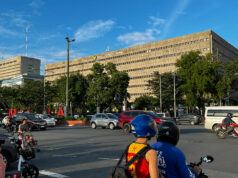I believe that safety should be everybody’s concern. Thus, ensuring public safety should always take priority over individual rights with respect to matters like mode of transportation. Much like smoking, people can choose to smoke, there is no law against that. But that smoking privilege is limited – or regulated by government – mainly to protect public health.
Adopting and enforcing certain standards – whether via industry or government regulation – will help particularly in curbing practices of some business that may be unintentionally putting profit ahead of worker safety by prioritizing logistical efficiencies. They should be flagged down for perpetuating a business model that put their people – and the public – in harm’s way.
Take the case of the food delivery business, where the “commitment” to fast and on-time delivery may be putting people at risk. A business model where a rider is paid per delivery, for instance, motivates a rider to do more deliveries in a day. But, in doing so, he or she may be inclined to take shortcuts, violate road and motoring rules, and ride recklessly.
And, assuming the validity of the argument that one behaves according to the way one is “measured”, then in a business that rewards a worker mainly for exceeding the guarantee of “on-time” delivery and penalizes delays, the worker may be more likely to take risks and probably disregard safety as long as he or she delivers on the “on-time” commitment.
I cannot exactly blame the riders. It is easy enough to say that everybody on the road should have discipline. However, if delivery people are not properly trained on what to do and how to do their work, and unless strict standards are applied in the conduct of their work, then there will always be the risk of lapses. I believe employers should be held responsible in this regard.
The way it works, at least for one popular food delivery group, is that if you own a bicycle or a motorcycle, or can borrow one, then you are practically all set to go to work. Submit requirements, pass some tests, and you are off. In fact, to test their system, I tried to apply as a rider. I went to the company’s portal, and was asked if I had either a bicycle or a motorcycle.
I first pretended to have a motorcycle, and then put in my name, date of birth, and mobile number. I was then directed to another web page that advised me to visit the company’s office and to bring with me a barangay clearance, a tax identification number, and the registration papers of my motorcycle. I was not asked if I had a valid motorcycle driving license. When I pretended to have a bicycle instead, the same details were required, less the registration papers. Also, a rider is required to have his own mobile phone. And, I believe, there are training rides for newbies.
The enticement? As a rider, you get to see new places, and that you can work full- or part-time. Also, that you can make as much as Php 120 per hour, and that all tips you receive you get to keep. You can earn as much as Php 40 per every order you deliver, and, of course, the more deliveries, the higher the income.
All good, right? All proper and legal? Perhaps a pay rate higher than minimum wage? Assuming Php 120 per hour and eight hours daily, then one can make as much as Php 960 daily, right? It seems to be a great opportunity for people looking for work, so what am I concerned about it? Well, because I see their delivery people on my city’s roads every day, and almost always, they are counterflowing or disregarding traffic lights and other road and motoring rules.
By counterflowing, for instance, they put not only themselves but also other motorists in harm’s way. Moreover, counterflow obstructs or slows traffic flow. Worse, in case of accidents, despite the fact the counterflowing is a violation, any bodily injury to the rider can still be a liability for the other party in the accident. Worse, the food delivery company may have no legal obligation to assist a rider who gets into an accident as a result of the rider’s negligence, recklessness, or a traffic violation.
Do these riders violate knowingly? I don’t know. Do they realize they are violating traffic rules by going against traffic? Maybe. Is their employer aware that they are violating traffic rules? Probably not. Are they motivated to ride perhaps recklessly just to make more deliveries and thus earn more for the day? Certainly. Profit is the very reason they ride, and speed is the only consideration that matters. Safety is out the window. Now tell me, who should be responsible? The rider or the employer?
Earlier this month, I chance upon the Facebook post of motoring journalist Ira Panganiban. He detailed how two delivery motorcycles from a popular food chain “were having a wonderful discussion side by side along Lubiran Road this morning, blocking traffic…[And] when overtaken, they had the gall to run after [overtaking] motorists and harass them.” Who is responsible? The riders or the food company that employs them?
I remember a case study in graduate school regarding a popular coffee chain that claimed their baristas were the best in the industry. And this was because their baristas – people who make coffee – undergo rigorous and intensive training prior to deployment to outlets. But, when asked how long the barista training took, the reply was about nine hours. Now you tell me, can we consider nine hours of training rigorous and intensive?
And this brings me to my point regarding food delivery and riders. How well are the riders trained for the work? How are they evaluated and compensated? How much company resources are devoted to preparing them and ensuring their safety as delivery people? What systems are in place to ensure public safety and riders’ strict compliance with road and traffic rules?
If one is to attend a motorcycle riding academy, the cost is about Php 4,000 for three sessions of theory and nine sessions of practical application. Each session takes about 90 minutes. You get a certificate for completing the course. Before the academy accepts a student, there is an evaluation — they ask the student to ride a bike around a small circuit, twice via pedal and twice via electric bike. And they require a medical certificate for students 50 years old and above.
How many delivery riders of today have undergone some form of training through a certified school or academy? Should a similar academy be put up for bicycle riders as well? Given current practices, and the competitive business environment, are we encouraging a food delivery business model that put riders and the public in harm’s way? Should we leave things as they are? How many motoring or traffic accidents in a year involve motorcycle and bicycle delivery services? How many related injuries and deaths so far? All for a fistful of pesos to the rider and a quick meal for us in 30 minutes or less?
Marvin A. Tort is a former managing editor of BusinessWorld, and a former chairman of the Philippines Press Council.



